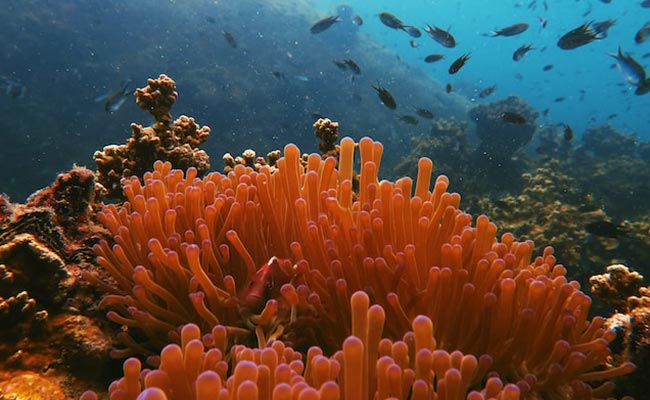On a recent trip to Chaweng Noi Beach in Koh Samui, I picked up a few pieces of washed up coral on the shoreline. The shapes fascinated the kids, so we took them back to the hotel with us.
It suddenly dawned on me that while I know touching or taking live coral from the ocean is illegal, I wasn't aware of the rules around dead coral washed up on the beach, or for purchasing souvenirs.
That evening I did some research online, and we duly returned the coral to the beach the following morning.
So what are the rules regarding coral collection and purchase in Thailand?

Coral near Koh Tao Pier, Thailand
Coral Collection in Thailand
A coral reef is a diverse underwater ecosystem primarily made up of coral polyps, which are tiny, sac-like animals that secrete calcium carbonate to form hard skeletons. These skeletons accumulate over time to create large, intricate structures. Coral reefs are found in warm, clear, shallow waters, primarily in tropical and subtropical regions around the world.
Coral reefs are often called the “rainforests of the sea” due to their incredible biodiversity. They provide a habitat for a wide range of marine species, including fish, crustaceans, mollusks, and various forms of algae.
Coral reefs are delicate and highly sensitive to environmental changes, such as rising sea temperatures and pollution. When stressed, corals can expel the symbiotic algae living within their tissues, causing a phenomenon known as coral bleaching, which can lead to coral death and the decline of reef ecosystems. Conservation efforts are essential to preserve these valuable marine environments for future generations.
In Thailand, the collection of coral and other marine resources is strictly regulated to preserve these delicate environments.
Here are the key rules governing coral collection:
1. Prohibited Collection
Several Thai laws are in place to safeguard the country's coral reefs. These include the Fisheries Act of 1947, the National Park Act of 1961, and the Enhancement and Conservation of National Environmental Quality Act of 1992.
Under Section 53 of the Fisheries Act, the possession of specific aquatic animals or their products, including coral, is prohibited unless the necessary permission or license has been obtained.
The collection of live coral, dead coral, and coral fragments is prohibited without the appropriate permits. This applies to both locals and tourists.
2. Permit Requirements
To collect coral legally, individuals must obtain permits from the Department of Marine and Coastal Resources (DMCR) in Thailand. Permits are typically granted for scientific research or reef restoration purposes.
3. Diving Guidelines
Divers must follow sustainable diving practices, including avoiding physical contact with coral and marine life. Anchoring on reefs is also strictly prohibited.
4. Heavy Penalties
Violations of coral collection regulations can result in severe penalties, including fines, imprisonment, or both. Thailand is committed to protecting its marine environment, and enforcement is rigorous.
Coral Souvenirs in Thailand
In Thailand you'll find a variety of coral-themed souvenirs, including jewelry, ornaments, and home decor. However, coral is listed under the Convention on International Trade in Endangered Species of Wild Fauna and Flora (CITES). The international trade of certain coral species is strictly regulated, and these rules apply to coral souvenirs as well.
When purchasing coral souvenirs, you should buy from reputable vendors who can provide proof of legality and sustainability. Ask for CITES certificates or documentation confirming that the coral used is sourced responsibly.
Red coral, in particular, is highly regulated, and its trade is restricted.
Despite there being a legal way to purchase coral, I advise that you avoid buying coral all together, even if a vendor is certified. This will ensure that you won't run into any trouble at customs. Indeed, some Thai airports, such as Krabi airport, have a complete ban on coral and shells on planes.
Consider the case below as a deterrent!
Tourists Arrested
In February 2018, two Russian tourists faced legal trouble during their vacation in Phuket, due to the possession of Thai coral. These young travelers reportedly purchased a small bundle of beach souvenirs from a local vendor. However, their accommodation owner tipped off the police about their possession of coral and seashells, which they were attempting to bleach.
Following their arrest, the women were released on bail, with their passports held as collateral while they awaited a court date. After several weeks of uncertainty, they finally appeared in court and were fined, though the exact amount remains undisclosed.
Speculation suggests it could have been as high as 20,000 THB (approximately $640 USD). Fortunately, they managed to avoid imprisonment and were allowed to return home to Russia by the end of March.
In Summary
Thailand's coral reefs are not only treasures of natural beauty but also crucial ecosystems that support marine life and protect coastlines. To ensure their survival, it is imperative to adhere to the rules and regulations regarding coral collection and coral souvenirs. Responsible tourists and vendors play a vital role in preserving these delicate ecosystems for future generations to enjoy.
Tips to Start Planning Your Trip Now:
Don’t Forget Travel Insurance
Travel insurance protects you against illness, injury, theft, and cancellations. I never travel without it. I’ve been using SafetyWing for years. You should too.
Book Your Accommodation
Best hotel rates for Thailand are found at Agoda
Considering a Backpack?
Check out this guide for the best options.
Last Updated on



Leave a Reply